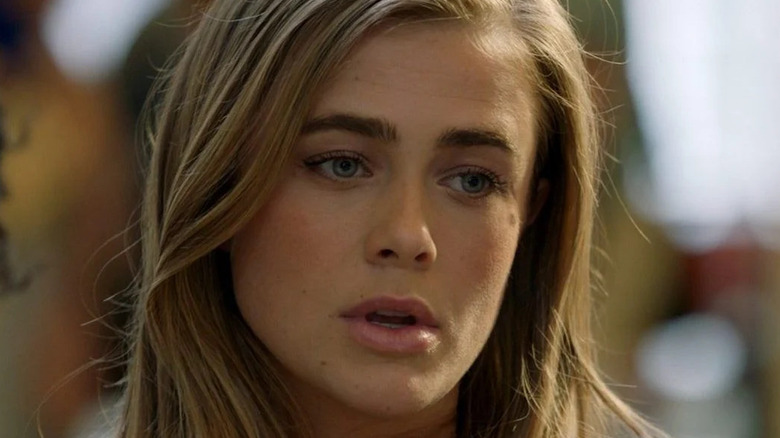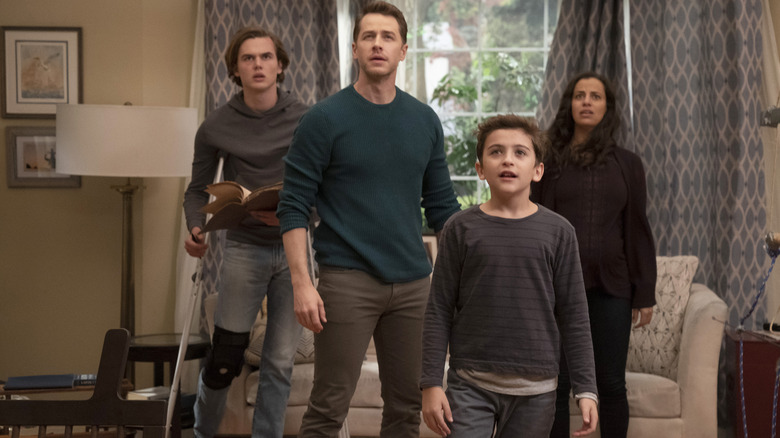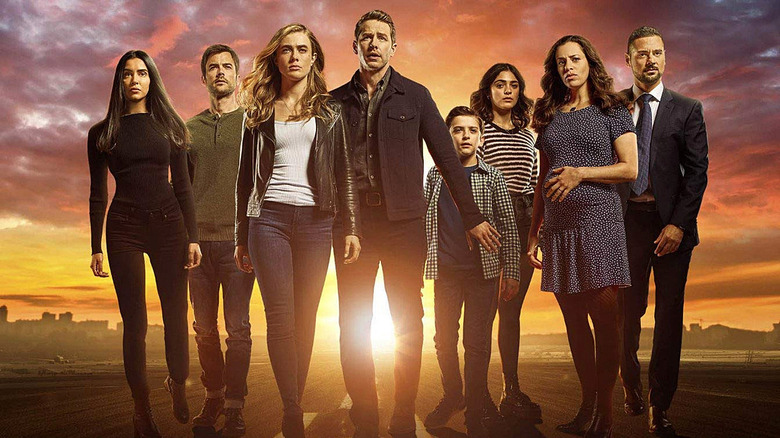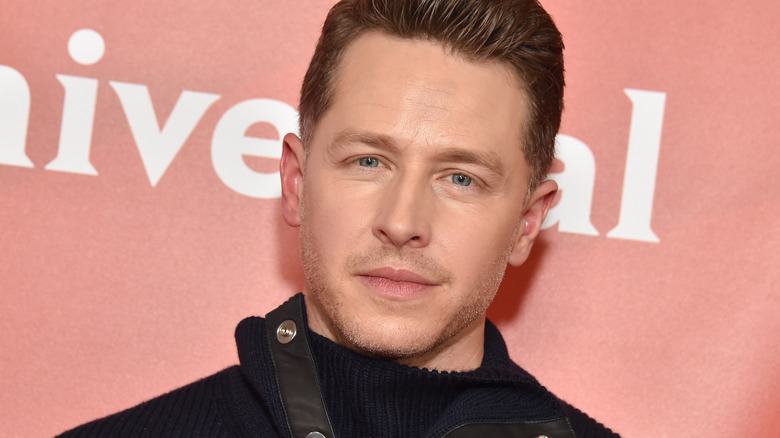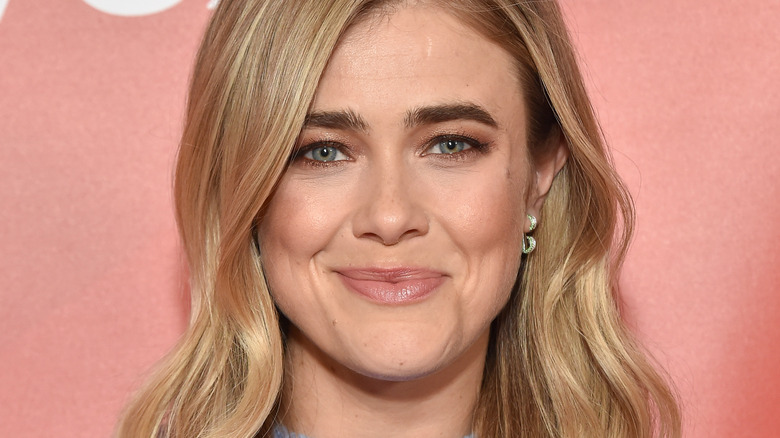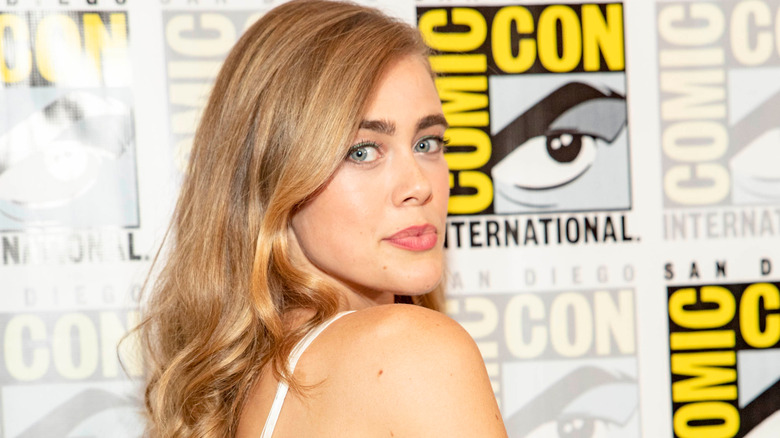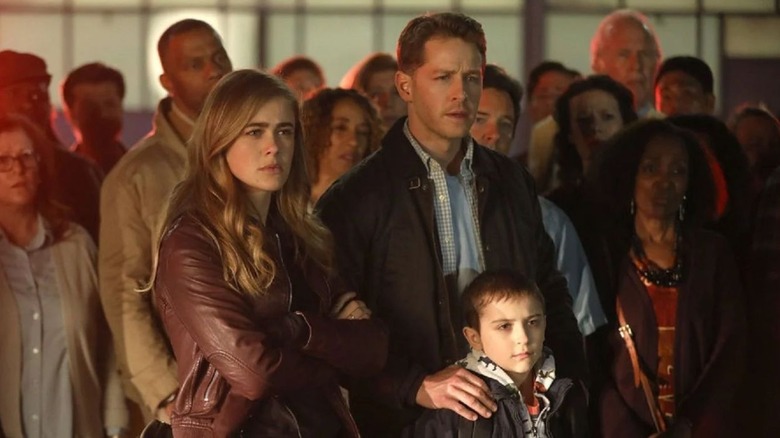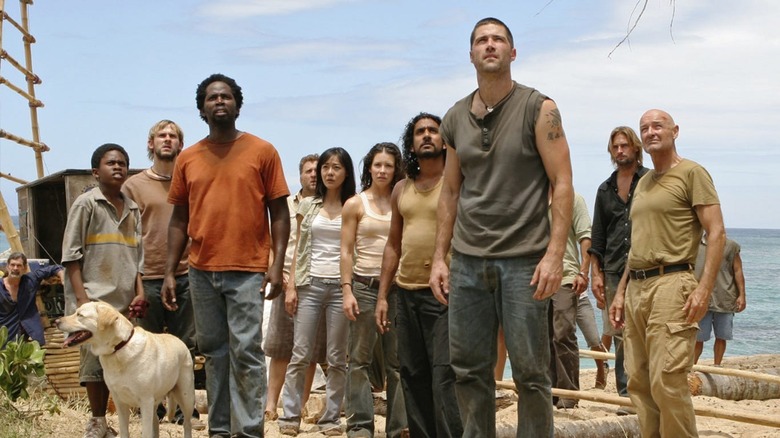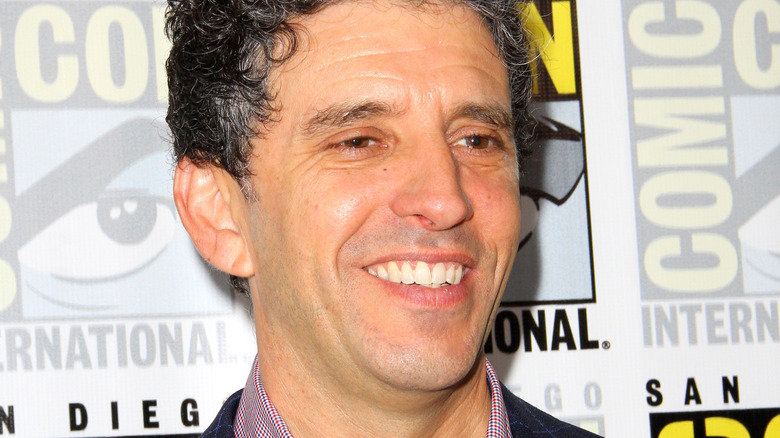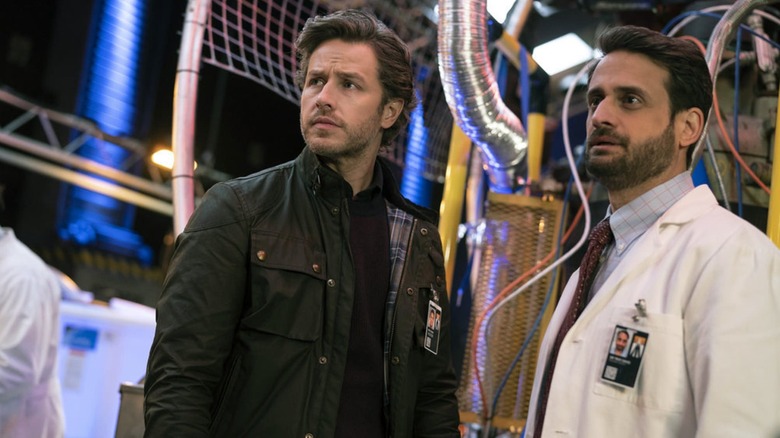The Untold Truth Of Manifest
Montego Air Flight 828 was supposed to be a routine trip from Jamaica to New York City. However, when the craft lands, all the passengers onboard learn that five-and-a-half years have passed since they took off. During that time, everyone on the plane was presumed to have perished. The sudden re-emergence of these passengers serves as the catalyst for the plot of "Manifest," an NBC drama that debuted in fall 2018 and immediately scored attention from both critics and general audiences alike for its twisty mysteries and thoughtful exploration of its characters grappling with a drastically upset status quo.
In reviewing the pilot, Daniel D'Addario of Variety commended the inaugural episode of "Manifest" for how it injected "real tension into the pre-landing sequence as the pilots fail to recognize the twist of fate the show's marketing has already revealed. It passes at least one test, making us care about its story even as we might otherwise be waiting for it to pick up steam."
That level of "care" towards the characters of "Manifest" has kept viewers glued to their TV screens for multiple seasons on both NBC and Netflix. However, even with all of the attention paid to "Manifest," there are still unexplored facets of the show, including the themes creator Jeff Rake believes it most exemplifies, as well as what factors attracted its lead actors. Even if you think you've cracked every mystery on "Manifest," the untold truth about this TV series is bound to surprise you.
The origins of Manifest
Once a TV show grabs onto its central audience and manages to become a hit, it can be hard to imagine a time where it wasn't just assumed to always be a sensation. But every TV show has to start as just an untested concept getting sold to producers and executives. In that state, anything can look like a risky long shot. So it was with "Manifest," which series creator Jeff Rake came up with years before it first got on the air, while also dealing with lots of rejection as he tried to sell it.
"I landed this idea over a decade ago and, at that time, I always knew the end game," Rake told Collider about the origins of "Manifest." "When I originally hit on the concept, I knew the beginning. I knew that I wanted this to be about a separated family and throwing at them the most tantalizing, impossible obstacle conceivable, in order to tear them apart and bring them back together again ... Over the course of the years after I was unsuccessful in getting anyone to bite at the concept, it spent a few years on the shelf. And then, I would noodle with it, and give it more shelf time. And then, I would try to get a producer interested, and noodle with it." After all that "noodling" that helped to refine the premise, Rake was eventually able to get "Manifest" off the ground and the rest is history.
The six year plan for Manifest
In the world of television, nobody knows anything, especially how long any given TV show will run for. But if you're making something that's meant to have an expansive mythology, it wouldn't hurt to have a game plan for how long it could potentially continue. So it is with "Manifest," a show whose creator said from the outset would run for exactly six seasons.
"I pitched it, as someone who didn't have a previous serialized show before, with a roadmap and clear chapters along the way," Jeff Rake noted to Syfy in January 2020. "We don't always know the number of episodes we get per season, so we roll with the punches. But the show wants to be six seasons." Rake also observed to Collider that the lengthy amount of time it took to get "Manifest" on the air helped to solidify the structure of the storytelling each season. "Throughout the seasons, there will be a couple of times where there's a bigger reveal, but then there will also be small little reveals each week," Rake explained. "Hopefully, people are paying close attention." Of course, the power to renew "Manifest" for further seasons was always out of Rake's hands and down to network executives. However, thanks to ironing out the finer details of his six-season plan, Rake was able to extend whatever control he could over how the expansive lore of "Manifest."
Core themes in Danny and the Stone family
Among the plotlines explored in the initial episodes of "Manifest" was Danny's (Daniel Sunjata) relationship with the Stone family, which entailed going on a date with Grace Stone after her husband and son were lost on that fateful Flight 828. Although Danny was not a lead character on the show, Jeff Rake saw the plotlines involving Danny bonding with someone else who lost a loved one as central to some crucial themes that would come to define the show's overall arc.
"I talk about the show as, among other things, exploring the concept of infidelity without moral culpability," Rake told The Hollywood Reporter about this Season 1 subplot. "It's our goal to be portraying a grounded, real-life scenario of what might transpire in a household when a family has been spread apart and inexplicably brought back together. In my mind, this story of Grace and Danny is right at the center of that." He added, "The goal here was to portray a family dynamic where everyone is standing with the angels. There are no villains within such a triangle; we understand all of their points of view, and there is no right or wrong, at least in terms of everything up to date." In the world of "Manifest," even minor characters like Danny can help unearth ideas that are crucial to the program's universe.
What attracted Josh Dallas to Manifest
After previously having a prominent role in "Once Upon a Time," Josh Dallas got attached to another broadcast TV program with an expansive mythology when he signed to star in "Manifest." But it wasn't just broad similarities with his prior work in television that drew Dallas to "Manifest." There were also specific qualities about this new story that made him intrigued enough to hop aboard the mysterious drama.
"I set out to find something that was a hook for me, that I felt emotionally invested in," Dallas explained to Showbiz Junkies about how he got involved in "Manifest." "When I read the pilot script for 'Manifest' it was this plane goes missing five and a half years ago and all of a sudden it lands again but no time has passed for the people on the plane. Immediately I wanted to know more. I wanted to know how that worked, what happens to a family, what happens [to] interrupted lives? What happens to a father with twins and a wife back at home?" He also observed that "Manifest" was essentially asking, "What do you do when you get a second chance? ... What are the choices that you make?" while adding, "There's so much. It's an emotionally rich landscape. It's 'Lost' meets 'This Is Us.'"
How Melissa Roxburgh lives in the moment
Given that "Manifest" was planned out from the start as a show that would run for six seasons, the long-term mapping of the program's narrative is not lost on the main cast, including Melissa Roxburgh. However, Roxburgh doesn't worry too much about what could happen in the future for her character Michaela. Instead, Roxburgh keeps her sights laser-focused on the here and now ... for the most part.
"When we first started the show, Josh [Dallas] and I had agreed that we were going to go with the flow and take each episode as it came," Roxburgh told Collider. "Then, every once in a while, one of the producers or writers would drop a little tidbit that would get us all curious. Now, I've found myself starting to hound everyone by going, 'What happens next?'" Though Roxburgh has been training herself to "try to go with the flow," that doesn't mean she isn't plagued by some level of curiosity as to where "Manifest" could go next. "As much as I'd like to say, 'No, I'm going with it,'" Roxburgh continued, "I'm super annoying to everyone. I want to know how it ends."
Roxburgh sees the humanity of Manifest as its key
Melissa Roxburgh has headlined "Manifest" for three seasons as the character Michaela, but given just how much the show offers in any given episode, it's anyone's guess what specific aspect of "Manifest" is Roxburgh's favorites. As it turns out, the ingredient she's embraced tightly is the humanity of the show's cast of characters, which keeps her grounded no matter what unexpected plot turns the scripts throw her way.
"I think that with any mythology, any supernatural, and any sci-fi, at the core of it, if you have people that you can relate to and you see your life in, then it's going to translate to an audience," Roxburgh said to Collider. "I love the mystery aspect of it, but I'm also drawn to it because I can look at Michaela and think, 'Yeah, I completely understand how she would feel in this situation,' despite me never having disappeared from past years." Roxburgh also cited "the family aspect, the relationships, the heartbreak, and the humor in parts of it" as other elements of the show she was attracted to, in addition to its central mystery. These have also proven to be the key ingredients that have inspired the program's passionate fan base as well.
How Manifest's viewership declined on NBC
When "Manifest" first debuted on NBC, it got off to a roaring start in terms of viewership. Watched by 10.4 million live viewers, "Manifest" topped all other shows in its time slot and was the third-most-watched program among all broadcast TV shows that night. By the end of its inaugural season, NBC was able to brag that "Manifest" was the most-watched new TV series for the 2018-2019 season in the 18-49 age demographic. Finishing near the top of all TV shows in terms of overall viewership that season, "Manifest" was a success for NBC.
However, things took a dive for the second season. The Season 2 viewership for "Manifest" in the 18-49 demo ended up being down 46% from its preceding season. Episodes sank to live viewership as low as just 3.55 million viewers, a nearly 70% drop from the viewership of its series premiere. Things didn't improve for the third season of "Manifest," which saw the series airing episodes during the summer for the first time. Falling another 40% from the second season in the 18-49 bracket, the Season 3 finale brought "Manifest" to an all-time low in terms of live viewership. The initial strength "Manifest" showed in its first season just didn't carry over to its subsequent seasons, at least when it came to audiences watching it on NBC.
The lessons Jeff Rake learned from Lost
It seems that, for the rest of time, all event shows with sprawling mythologies on broadcast television will forever be living in the shadow of "Lost." That show wasn't the first to execute long-form storytelling in this medium, but it did become one of the most popular. A program like "Manifest" was bound to draw comparisons to the iconic events of "Lost" and series creator Jeff Rake made sure to take some valuable notes from that show and other similar pop culture properties.
"I think what I've learned just from being a fan of serialized event mysteries, but also more broadly just being a fan of television drama, is that shows that sustain have great and compelling characters at their core," Rake told SyFy. "When I set out to create this show, I knew that I had a tantalizing premise and then I set out to cast that premise with a core ensemble of complicated, appealing, and relatable characters." By focusing on those characters, "Manifest" was able to make sure it wasn't just another broadcast TV show emulating the "Lost" template.
What Jeff Rake views as core themes of Manifest
Over the course of its run, "Manifest" has dealt with a lot of strange developments that have kept viewers coming back to figure out where the show's universe will go next. In the middle of all the peculiar twists and turns, series creator Jeff Rake has kept laser-focused on a handful of core ideas that have ensured the show never loses sight of its humanity, no matter where the narratives go.
In talking to Syfy about the third season of "Manifest," Rake observed, "The underlying themes that we hit as frequently as we can in 'Manifest': damage, healing, redemption." Rake cited the character of Michaela as a specific example of this, noting, "We've been telling the story of the emotional damage that she carries around every day of her life in regards to Evie, her best friend who died not long before the plane disappeared. Michaela has always felt responsible for Evie's death," adding that the rest of the third season would follow Michaela as she "metaphorically steps further down that path of healing and redemption." Keeping these concepts at the forefront of Michaela's storyline, as well as the exploits of the other characters, has rooted "Manifest" in something discernibly human.
What it was like for Holly Taylor to join Manifest
For its third season, "Manifest" added a new actor to its main cast, Holly Taylor. This veteran of "The Americans" swapped Russian spies on FX for mysterious thriller adventures on NBC. Taylor's experiences in terms of joining this program were unique, especially since they happened under the confines of shooting during the coronavirus (COVID-19) pandemic.
"They've all been together for two seasons now and they're like a family. It's already a little weird being the new kid," Taylor told Syfy about joining the long-established "Manifest" cast. "You want everyone to know that you're nice, and you're a good person because I'm a people pleaser. [Laughs.] But on top of that, you have to eat lunch by yourself in your room. And you can't be closer than six feet together, even in between scenes. It was hard, but I got really, really lucky that the cast was so welcoming and so nice." It's always a challenge to join the main cast of a TV show that's already been on the air for a few years, especially in the middle of a pandemic, but the cast of "Manifest" clearly tried to make that process painless for Holly Taylor.
Jeff Rake's reaction to NBC axing Manifest
In June 2021, devastating news hit "Manifest" fandom: the show had been canceled by NBC. Having already run for three seasons at that point, there were still plenty of dangling plot threads in "Manifest" that now appeared to be doomed to never get resolved. Nobody seemed to take this sudden demise worse than series creator Jeff Rake, who penned a statement to express his feelings to the program's loyal fan base.
"My dear Manifesters," Rake wrote on Twitter. "I'm devastated by NBC's decision to cancel us. That we've been shut down in the middle is a gut punch to say the least. Hoping to find a new home. You the fans deserve an ending to your story. Thanks for the love shown to me, cast, and crew." Though Rake shared in the sorrow of the fans, his mention of "a new home" gave those same people an inkling of hope during a tumultuous moment. If this truly was the end for "Manifest," Rake engaging with the show's fan base in such a heartfelt manner certainly wouldn't be the worst way it could go out.
The massive Netflix viewership of Manifest
Though "Manifest" struggled to maintain its ratings momentum on NBC, one place it had no trouble securing eyeballs was on Netflix. This show's first two seasons were brought to Netflix in early June 2020, timed right to when NBC announced that it would not renew "Manifest" for a fourth season. Whether what followed was influenced by fans attempting to show support for "Manifest" in response to this decision or merely a coincidence is hard to say. Whatever caused it, according to Deadline, "Manifest" immediately became one of the most-watched TV shows on Netflix once it debuted on the platform.
The success for "Manifest" on this platform was not just limited to when it first popped up on the streamer, though. Throughout June 2021, "Manifest" repeatedly topped Nielsen's list of most-watched streaming programs in the United States. This meant that "Manifest" was viewed more than original streaming TV shows like "Loki," "Lucifer," and "The Handmaid's Tale." This enormous success on Netflix didn't come out of the blue, though, Outlets like Deadline speculated that this surge in viewership was tied into reversing the show's cancellation. By August 2021, it appeared that these astonishing streaming viewership numbers were accomplishing that potential goal, with Vanity Fair reporting that Netflix was looking to revive "Manifest" largely because of its sizeable viewership on the streamer.
